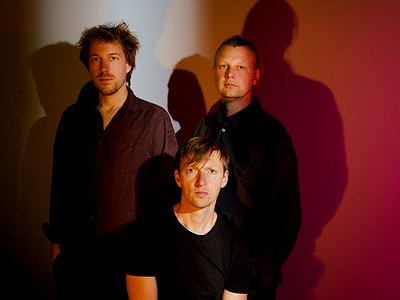Name: Melt Trio
Members: Peter Meyer (guitar, electronics), Bernhard Meyer (bass), Moritz Baumgärtner (drums, gongs, megaphon)
Interviewee: Peter Meyer
Nationality: German
Occupation: Composers, instrumentalists, improvisers
Current release: Melt Trio's Consumer is out November 4th via Fun in the Church.
If you enjoyed this interview with Melt Trio and would like to know more about the band, visit their official website.
When did you first start getting interested in musical improvisation?
When I was 12 or 13 years.
Which artists, approaches, albums or performances involving prominent use of improvisation captured your imagination in the beginning?
Starting with Blues music: B.B. King, Jimi Hendrix. Jazz a bit later: Keith Jarrett, Bill Frisell, Pat Metheny, Jan Gabarek. ECM stuff.
Focusing on improvisation can be an incisive transition. Aside from musical considerations, there can also be personal motivations for looking for alternatives. Was this the case for you, and if so, in which way?
Yes. When I was young I loved the complexitiy of improvisation; Harmonics, chords etc ... Like a tree, I will never be able to climb. Something to dive in completly. And of course the freedom.
What, would you say, are the key ideas behind your approach to improvisation? Do you see yourself as part of a tradition or historic lineage?
Not that much in the tradition, but not completely apart of it.
I try to trust my intuition, and to establish a connection between my reptilian brain and my instrument.
What was your own learning curve / creative development like when it comes to improvisation - what were challenges and breakthroughs?
A lot happened in the beginning: Modal, free, sounds, own ideas, being creative in the small town I grew up.
Then a second jump forward, when moving to Berlin. Learning the tradtion and contemporary concepts, meeting all those great musicians.
Tell me about your instrument and/or tools, please. How would you describe the relationship with it? What are its most important qualities and how do they influence the musical results and your own performance?
Electric Guitar: Still love it like a kid, the shape, colour, electronic parts.
A lot of pedals: Used them from the very beginning, and they are a part of my instrument now. Like a drummer; My hands and feet are connected.
Electronics: Coding my own samplers/FX/digital instruments. This became an extension of my composing and improvising.
Can you talk about a work, event or performance in your career that's particularly dear to you? Why does it feel special to you? When, why and how did you start working on it, what were some of the motivations and ideas behind it?
The first gigs with Melt Trio. We could play regularly in a bar in Kreuzberg. We had some sketches, some compositions which we did´t know how to play.
We developed a lot there; collective impros, new ways to create energy.
How do you feel your sense of identity influences your collaborations? Do you feel as though you are able to express yourself more fully in solo mode or, conversely, through the interaction with other musicians? Are you “gaining” or “sacrificing” something in a collaboration?
Definitly gaining. No doubt. Being able to lift someone up, or being uplifted is the best.
When you're improvising, does it actually feel like you're inventing something on the spot – or are you inventively re-arranging patterns from preparations, practise or previous performances?
Both. Depending on the music and the situation. But inventing is the goal.
To you, are there rules in improvisation? If so, what kind of rules are these?
No rules. But I don't like everything; like musical jokes, or performative stuff. I have some issues with that.
In a live situation, decisions between creatives often work without words. How does this process work – and how does it change your performance compared to a solo performance?
You always have to create a connection with the other person. Get a feel for the vibe, the energy, the movement. What can you do, to make the others and the music strong.
Find a common ground. Find a language on the spot.
There are many descriptions of the ideal state of mind for being creative. What is it like for you? In which way is it different between your solo work and collaborations?
In a solo performance you have to be “on” all the time. It can be hard to get feedback from somewhere or something. This involves more active thinking or strategies maybe.
In a band others can keep the energy, you can stop, you can support or you can fly on top. You can put yourself in different roles.
For me that means that I can be more creative, more in the moment, more inventive.
How do you see the relationship between sound, space and performance and what are some of your strategies and approaches of working with them?
There is a strong connection between the room, its size, colour, reverb, the instruments, the audience. But I usually don´t try to adapt with a concept. It just happens.
In a way, improvisations remind us of the transitory nature of life. What, do you feel, can music and improvisation express and reveal about life and death?
Puh. Not sure about the death part, I don´t know much about that yet. It can reveal a lot about yourself, how you interact with others, how you react in different situations.
When I am improvising with great musicians and the music is good, it just feels really good: Concentrated, focused, relaxed, detached from time. Sometimes it feels as if you could bend the room or you can create a little planet with gravity afecting everything around us.
You might feel or even become high just from music. Not sure if this reveals something about life.




